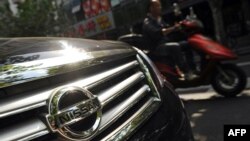BEIJING —
Japan has cut production at some of its factories in China amid rising tension over a group of islands in the East China Sea.
Production at several Japanese factories has halted or slowed in the wake of anti-Japanese protests in China. Nissan, Japan’s top automaker in China, says production at its joint venture in the country will stop three days earlier than planned prior to China’s national holiday. Suzuki says it will stop one of two shifts it runs in China.
The production cuts follow a rash of recent protests that swept across Chinese cities, about contested islands in the East China Sea known as the Diaoyu Islands in China and Senkaku Islands in Japan.
Andrew Batson, research director for GK Dragonomics, says the anti-Japanese protests could be a cautionary sign for other international investors in China. “The foreign business community is watching this stuff carefully because they’re worried this popular anger that is to some extent encouraged by the government here can spread beyond anger and target the very substantial foreign investment operations of multinational companies here,” he said.
Japan’s automakers have invested heavily in China, a country that has been a main driver of growth in the global auto industry. Toyota also says it is cutting output because of a slowdown in demand.
Toyota had set a target to sell one million cars in China this year. As of August, Japanese automakers had a 19 percent share of China’s passenger car market. Those sales may have declined in the wake of last week’s protests, but analysts like Batson note that previous protests against the United States after the Kosovo bombing in 1999 and France in 2008 did not result in long-term boycotts of products from those countries. He says cuts in factory production may have more to do with a looming recession.
“I think it’s hard to separate this from what’s been going on in the Chinese economy all year, which is a pretty severe slowdown,” Batson explained.
Meanwhile, diplomats from China and Japan met late Tuesday, on the sidelines of the United Nations General Assembly in New York, to try and make some headway in resolving the dispute. Japanese Chief Cabinet Secretary Osamu Fujimura describes the meeting as tense.
He says there is no wizardry in foreign policy and the two countries need to discuss broader perspectives through various levels and channels.
Japan’s purchase of what China calls the Diaoyu Islands last month from a private owner sparked long-simmering anger in China towards the Japanese about atrocities committed during World War Two.
Both countries face major political transitions. China’s Communist Party is expected to hand over leadership roles in October, and Japan faces an election battle within the next few months.
Production at several Japanese factories has halted or slowed in the wake of anti-Japanese protests in China. Nissan, Japan’s top automaker in China, says production at its joint venture in the country will stop three days earlier than planned prior to China’s national holiday. Suzuki says it will stop one of two shifts it runs in China.
The production cuts follow a rash of recent protests that swept across Chinese cities, about contested islands in the East China Sea known as the Diaoyu Islands in China and Senkaku Islands in Japan.
Andrew Batson, research director for GK Dragonomics, says the anti-Japanese protests could be a cautionary sign for other international investors in China. “The foreign business community is watching this stuff carefully because they’re worried this popular anger that is to some extent encouraged by the government here can spread beyond anger and target the very substantial foreign investment operations of multinational companies here,” he said.
Japan’s automakers have invested heavily in China, a country that has been a main driver of growth in the global auto industry. Toyota also says it is cutting output because of a slowdown in demand.
Toyota had set a target to sell one million cars in China this year. As of August, Japanese automakers had a 19 percent share of China’s passenger car market. Those sales may have declined in the wake of last week’s protests, but analysts like Batson note that previous protests against the United States after the Kosovo bombing in 1999 and France in 2008 did not result in long-term boycotts of products from those countries. He says cuts in factory production may have more to do with a looming recession.
“I think it’s hard to separate this from what’s been going on in the Chinese economy all year, which is a pretty severe slowdown,” Batson explained.
Meanwhile, diplomats from China and Japan met late Tuesday, on the sidelines of the United Nations General Assembly in New York, to try and make some headway in resolving the dispute. Japanese Chief Cabinet Secretary Osamu Fujimura describes the meeting as tense.
He says there is no wizardry in foreign policy and the two countries need to discuss broader perspectives through various levels and channels.
Japan’s purchase of what China calls the Diaoyu Islands last month from a private owner sparked long-simmering anger in China towards the Japanese about atrocities committed during World War Two.
Both countries face major political transitions. China’s Communist Party is expected to hand over leadership roles in October, and Japan faces an election battle within the next few months.










